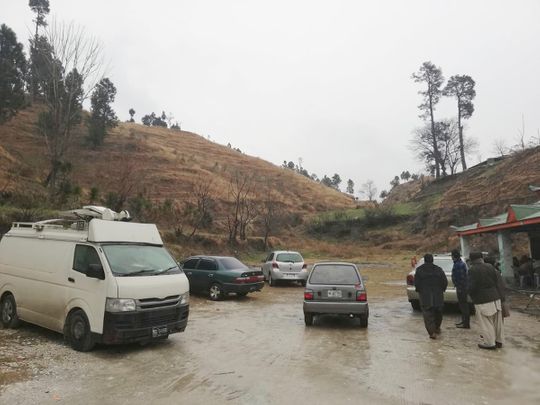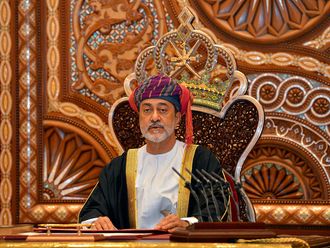
Dubai: People in India and Pakistan this morning woke up to a sudden escalation of tension between the two south Asian neighbours. Indian Air Force jets Mirage 2000 flew early Tuesday morning and carried out strikes across the border and returned home.
Indian officials said it destroyed terrorists’ training camps of Jaish-e-Mohammad in pre-dawn strikes and 12 Mirage 200 jets dropped 1,000 kg bombs. Jaish had claimed responsibility for the attack on security forces in India’s Pulwama where over 40 paramilitary soldiers were killed on February 14.
Responding to the attack, Pakistan’s National Security Committee (NSC) “strongly rejected the Indian claim of targeting an alleged terrorist camp near Balakot as well as the claim of heavy casualties”.
“Once again the Indian government has resorted to a self-serving, reckless and fictitious claim,” a statement said. “This action has been done for domestic consumption being in election environment, putting regional peace and stability at grave risk.”
The world is now waiting to see how Pakistan responds to this daring cross-border raid by Indian jets.
Will Pakistan retaliate immediately?
The short answer is ‘No’.
First, let’s analyse what India has achieved by this operation. By carrying out this operation, the Indian government has calmed public anger that was simmering since the February 14 attack in Pulwama. Also, the attack has sent a clear signal to the international community that India will not sit back and rely solely on diplomacy when its soldiers are massacred in such a ruthless manner.
However, while the Indian officials said the air force raids killed “300 terrorists” and destroyed terrorists’ infrastructure, their cleverly worded briefing de-hyphenated Pakistan’s sovereignty or its army from this operation.
While briefing the media, Indian’s Foreign Secretary Vijay Gokhale said it was targeted at the Jaish-e-Mohammed camp and the "selection of the target was also conditioned by our desire to avoid civilian casualties," NDTV reported.
“In an intelligence-led operation in the early hours of today, India struck the biggest training camp of JeM in Balakot. In this operation, a very large number of JeM terrorists, trainers, senior commanders and groups of jihadis who were being trained for fidayeen attacks were eliminated. This facility at Balakot was headed by Maulana Yousouf Azhar, also known as Ustad Ghouri, the brother-in-law of JeM chief Masood Azhar."
“Credible intelligence was received that JeM was attempting another suicide terror attack in various parts of the country, and the fidayeen jihadis were being trained for this purpose. In the face of imminent danger, a pre-emptive strike became absolutely necessary,” added Gokhale.
Gokhale’s choice of the words ‘non-military, pre-emptive strike’, in my opinion, serves a huge purpose. One, it seeks to convey that Tuesday’s operation was not an attack on Pakistani nation or its sovereignty. Second, that it was a pre-emptive strike solely aimed at destroying terrorist infrastructure and killing terrorists who, the Indian officials said, were planning attacks across the country.
How has Pakistan responded?
At 5:12 am India time, Pakistani army spokesman Maj General Asif Ghafoor broke the news of the attack with a two-line tweet: “Indian Air Force violated Line of Control. Pakistan Air Force immediately scrambled. Indian aircrafts gone back. Details to follow.”
At 7:06 am IST, another tweet came from him: “Indian aircrafts intruded from Muzafarabad sector. Facing timely and effective response from Pakistan Air Force released payload in haste while escaping which fell near Balakot. No casualties or damage.”
At 9:56am, the spokesman posted four pictures and later tweeted: “Indian aircrafts’ intrusion across LOC in Muzafarabad Sector within AJ&K was 3-4 miles. Under forced hasty withdrawal aircrafts released payload which had free fall in open area. No infrastructure got hit, no casualties. Technical details and other important information to follow.”
Clever wording
A quick analysis of the choice of words used by Indian and Pakistani officials in the aftermath of the pre-dawn strike reveals that both the sides are cautiously trying to avoid a situation where the forces of the two nuclear-armed nations have to face off at the international border.
By calling it a “non-military” and a pre-emptive strike, the Indians have saved Pakistani government and its powerful army the humiliation of enemy forces venturing inside its territory. Also, Indian officials have not clearly pinpointed which Balakot the IAF pilots attacked – the one in Khyber-Pakhtunkhwa or the one near the LoC. The ambiguity on Balakot is convenient to both India and Pakistan for obvious reasons – while India says it struck deep into the Pakistani territory, Pakistan insists the jets came just “3-4 miles” inside.
Also, Gokhale avoided referring to the location as being in Pakistan or PoK, short form of Pakistani Occupied Kashmir, a term used by India to refer to Pakistan Administered Kashmir.
Despite the apparent tension, an immediate escalation is unlikely and both the sides will focus on managing the domestic impact of this operation.








